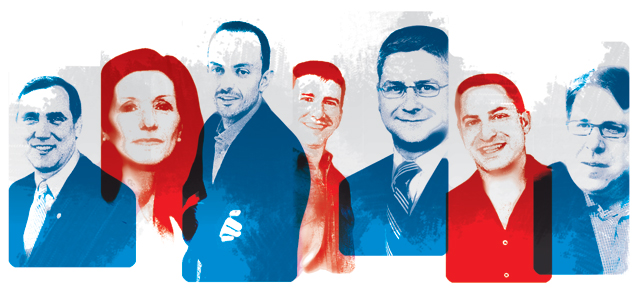It’s that classic story: Guy has idea to buy beer company. Guy tries to raise funds. Guy catalyzes new federal legislation.
 Michael Migliozzi opened up more than just a tasty beer when he tried to buy Pabst Brewing Co. using crowdfunded money. photograph by alyson aliano, wardrobe and prop styling: kristina van dyk
Michael Migliozzi opened up more than just a tasty beer when he tried to buy Pabst Brewing Co. using crowdfunded money. photograph by alyson aliano, wardrobe and prop styling: kristina van dykThe world is about to have a whole lot more angels. Thanks to the JOBS (Jumpstart Our Business Startups) Act that was enacted this April, average people will soon be able to use crowdfunding investment platforms to become equity shareholders in startups. Here, the story of that bill's more-than-two-year gestation is told by the principal characters--from a pair of lawmakers to a joker running an L.A. ad firm.
ACT I: The Accidental Catalyst
Michael Migliozzi, managing partner, L.A. ad agency Forza Migliozzi: It started as a joke in November of 2009. I saw in the New York Post that Pabst Brewing Co. was for sale for $300 million, so I tweeted, "Why don't we crowdsource this?" Five days later, I launched BuyABeerCompany.com. Within two months, I had $210 million in pledges. The joke had gotten serious. Then in March [2010], the SEC contacted me. They wanted my employees' names, access to hard drives, everything. I began hearing from lawyers trying to ensure it stayed civil, not criminal. This was a social experiment--how was it suddenly a jailable offense? In June, I had to go to Philadelphia for an SEC deposition.
"When it comes to securities laws, there's a paternalistic view that average investors can't make these decisions for themselves."
Congressman Patrick McHenry (R-NC); member of House Committee on Oversight and Government Reform: Last spring, I read in The Wall Street Journal about the PBR situation and had my staff call Michael. He was fascinating because he got into this not realizing the regulatory hurdles: Because of acts dating back to 1933 and 1934, only friends and family or accredited investors could invest in a business.
Migliozzi: At first, the SEC questioned the legality of BuyABeer. Once they learned no money was exchanged, only pledges, they asked me about violating a 1933 act because I was offering a security for sale.
McHenry: When it comes to securities laws, there's a paternalistic view that average investors can't make these decisions for themselves. It's inappropriate.
Sherwood Neiss, cofounder, FLAVORx; cofounder, Startup Exemption: For 15 years, my business partner Jason Best and I have been entrepreneurs. We've seen how hard it is to raise capital and knew peer-to-peer lending was a solution that was working. We thought, Why not apply those principles to real investing?
Jason Best, tech and health-care entrepreneur and consultant; cofounder, Startup Exemption: In early 2011, we started discussing ideas for a bill that would permit crowdfunding. Then in February, we started working in D.C. to push through the legislation.
 The Storytelling Cast (from left to right): Senator Jeff Merkley, Karen Kerrigan, Maurice Lopes, Jason Best, Congressman Patrick McHenry, Sherwood Neiss, Jeff Lynn
The Storytelling Cast (from left to right): Senator Jeff Merkley, Karen Kerrigan, Maurice Lopes, Jason Best, Congressman Patrick McHenry, Sherwood Neiss, Jeff LynnNeiss: Our message was: This is about jobs. You can have entrepreneurs with ideas, but you will have no businesses with no jobs unless there's capital.
Jeff Lynn, CEO, Seedrs Limited, a U.K.-based equity crowdfunding platform: I learned Darrell Issa, chairman of the House Committee on Oversight and Government Reform, had asked [SEC chairman] Mary Schapiro what the SEC was doing to help free up capital for startups. Crowdfunding was at the bottom of the list. In April [2011], I shot them both a letter, saying, "Here's what we're doing in Britain, happy to tell you about it." Issa replied and asked me to testify at a hearing he was arranging. I agreed.
Neiss: Issa called the first hearing in May [2011]. We presented, and he told us, "I think you're on to something." He said he was going to call for another hearing. That's where McHenry came in.
McHenry: That summer, my staff and I discussed capital formation. They showed me Kickstarter, and I looked into peer-to-peer lending. Why could people loan money for startups but not get equity?
Best: We worked with McHenry's staff to create a framework for the bill. Then it was a domino effect.
ACT II: The Battle of the Bills
McHenry: The bill I introduced was called the Entrepreneur Access to Capital Act. In November, it passed in the House with more than 400 votes and rare bipartisan support. It was a collaborative process: Some colleagues across the aisle had concerns about fraud prevention and investor protection, and we were able to incorporate some of their ideas.
Karen Kerrigan, president and CEO, Small Business and Entrepreneurship Council: McHenry's bill addressed fraud concerns in terms of registering with the SEC and investors taking tests. Those 400 votes sent an amazing message in terms of belief that this really was a solution for small businesses.
McHenry: Right before the House vote, the President made a statement saying he supported the bill and would sign it. That helped. Then it became a matter of working with the Senate to get it through.
Lynn: McHenry's bill was the early stages. I figured at least one new bill would be introduced. What moved forward in the Senate was a combination of bills.
In November and December, two new bills were introduced: Senator Scott Brown's (R-MA) Democratizing Access to Capital Act and Senator Jeff Merkley's (D-OR) CROWDFUND Act, respectively.
Best: We met with Senator Brown's office in November, shortly after he introduced his bill. On December 1, the Senate was going to debate the issue. We asked if we could participate in the hearings to make sure there was a pro-crowdfunding voice.
Kerrigan: State regulators were all over the Hill talking about fraud issues. Presently, investors have to report to them, so they see crowdfunding as a threat.
Neiss: We were battling funding lobbyist groups and spent well over $30,000 of our personal money. We walked the halls to make our case for innovation and jobs, stating that we're not Republicans or Democrats; we're entrepreneurs.
ACT III: Crowdfunding Is Now
On March 27, 2012, the CROWDFUND Act by Senators Brown, Merkley, and Michael Bennet (D-CO) passes with the JOBS Act.
Best: I was watching C-SPAN in my hotel when I learned it passed. I just sat there, numb. Twenty hours earlier, we thought we were going home empty-handed.
McHenry: Unfortunately, what the Senate added limits the scope of crowdfunding. There will be a cap of $1 million; I wanted it to be $5 million. We didn't require an intermediary, a platform for crowdfunding issuances to be done. They do. My one outright objection is that the Senate put a ban on general solicitation, which means you can't speak about your offering outside the platform you're doing it on. So if I'm trying to buy $100,000 worth of servers, I can't post on Facebook or tweet about the investment opportunity. That's proof the majority of the Senate doesn't fully understand crowdfunding.
Merkley: We made the changes we did because in the House bill, companies were allowed to raise up to $1 million while providing no financial information to investors. This would have led to predatory practices. Our bill requires disclosures such as a business plan, financial information, and shareholder rights. The House bill also allowed shell companies with no history to sell stocks, while our bill establishes funding portal websites that must register with the SEC.
Maurice Lopes, CEO, EarlyShares.com, one of many U.S.-based crowdfunding platforms to emerge: In the early days of peer-to-peer lending, people said it would be the Wild West of fraud. We're hearing the same thing now.
Lynn: Fraud and hucksters are a minor concern with the immense amount of transparency on the web. The real issue, which we address with Seedrs, is the boring technicalities that go along with investing in a startup. If you invest in the next Facebook and it takes off, it's worth billions--but if the board dilutes your shares, you're not worth a thing. I don't think most U.S. lawmakers and crowdfunding advocates understand how private investments are made.
Lopes: Our solution to this is structuring shareholders as a group of investors. If you raise $250,000 on our platform, you might have 1,000 investors who each put in $250. We pool them all into one entity. That provides protection from a liability perspective, and the stock is issued to a single entity so it can't be diluted.
McHenry: The SEC has 270 days from the day of enactment to issue final rules on crowdfunding. I'll be sending letters and having meetings to make sure the ones they create allow this space to flourish.
Migliozzi: Ultimately, the law ended up changing, so something good came out of all this. Change was effected by an ad guy coming in and doing something no one else was dumb enough to do.
Epilogue
In June 2010, billionaire C. Dean Metropoulos bought Pabst for a reported $250 million. His two sons run operations. Last year, Pabst's four top brands experienced double-digit declines.
A version of this article appears in the June 2012 issue of Fast Company.
DIGITAL JUICE
No comments:
Post a Comment
Thank's!